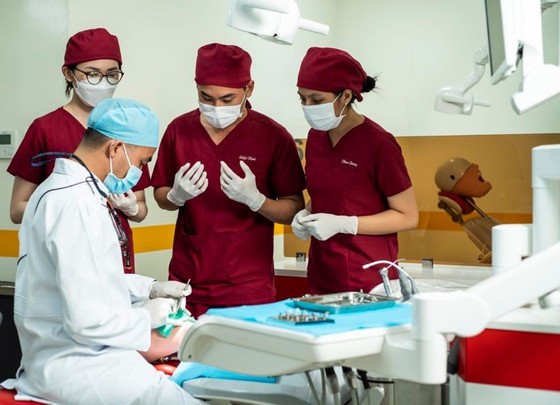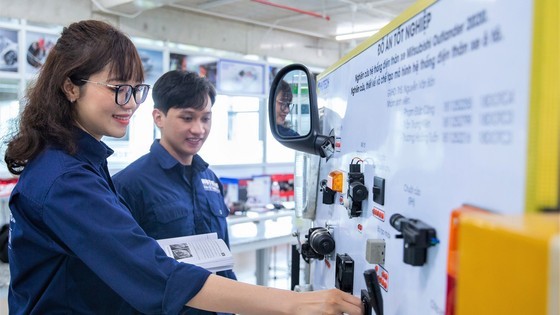 |
Students of Van Lang University in their class |
Private universities are not only racing to open new majors and find ways to increase enrolment quota, but these schools also continuously increase tuition year after year as well. Moreover, if any school increases its enrolment quota more strongly, its next year's revenue will increase significantly compared to the previous year. Worse, this race seems to have no end!
In its published information on the enrolment plan and goals for implementing three things on the Van Lang school’s website, sky-high cost is quite visible. For instance, in the school year 2022-2023, the tuition fee in the school fluctuates from VND22 million - VND32 million (US$905 - US$1,317) a semester. Meanwhile, students enrolling in special majors will pay from VND40 million- VND60 million per semester. Specifically, those registered to study dentistry major will pay tuition fees over VND80 million a semester.
Furthermore, in the 2022 academic year, students must pay VND20 million-VND27 million tuition fee a semester for this school's standard training program depending on their majors whereas the 2020 school year was only from VND15 million-VND20 million a semester. At Hong Bang International University, students studying the Bachelor of Dentistry and Medicine major paid VND105 million tuition fee a semester for the 2022 school year while their peers of English major paid VND125 million per semester.
The average annual published cost for majors at Ho Chi Minh City University of Technology (HUTECH) in 2023 is about VND16 million-VND18 million per semester. Apart from that, students of Pharmacy faculty have an average tuition of about VND18 million-VND20 million a semester. Meanwhile, in the 2022 school year, tuition fees for majors range from VND13.6 million-VND14.4 million a semester while the tuition fee of Pharmacy faculty is VND16 million a semester. Thus, on average, the school's tuition increases each year within a range of 8 percent to 10 percent.
 |
Students majoring in Automotive Engineering Technology at Ho Chi Minh City University of Technology (HUTECH) introduce the graduation projects |
Similarly, in the 2023 school year, tuition fees at many other private universities such as Hoa Sen University, Nguyen Tat Thanh University, Mien Dong University of Technology, Lac Hong University, and Dong Nai University of Technology also increased by at least 10 percent-20 percent compared to the previous year.
Along with increased tuition fees, enrollment quotas of private universities also rise each year. For example, in the 2022-2023 school year, Ho Chi Minh City University of Technology was allowed to recruit 12,500 students for 59 training majors while the school's admission quotas were only 7,600 students in 2022 and 6,600 students for 50 majors in 2021.
Hong Bang International University is steadily increasing its enrollment quota each year. In the 2020 school year, Hong Bang International University had an enrollment quota of 2,660 but it increased to 3,330 students in 2021; 4,210 students in 2022 and 4,800 students this year.
For the 2022-2023 school year, Van Lang University was allowed to admit more than 16,000 students while in the prior academic year, the school was allowed to receive more than 8,600 students. A survey of revenue sources from private universities has shown that many schools have revenue of over trillions of billions of Vietnamese dong in the 2021-2022 school year.
First of all, Van Lang University has a fairly high revenue. The school's revenue was VND1,073 billion (US$44,213,355) In 2021 and VND1,758 billion (US$72,513,384) in 2022. Nguyen Tat Thanh University has a total revenue of VND1,162.4 billion in 2022, of which VND1,141 billion comes from tuition revenue. Elsewhere in Ho Chi Minh City, the city University of Technology also collected VND1,145 billion in revenue mainly from tuition fees in the 2021- 2022 school year.
Some schools with revenue of over VND500 billion to less than VND1,000 billion include Hoa Sen University, Hong Bang International University, and Ho Chi Minh City University of Economics and Finance. Hoa Sen University achieved VND918 billion comprising of VND680 billion from tuition fees. Hong Bang International University has a total revenue of VND886 billion, of which tuition revenue is VND822 billion; and Ho Chi Minh City University of Economics and Finance has a revenue of VND507 billion. Based on the financial statements of private universities, it can be seen that tuition fees almost account for nearly 100 percent of sources of revenue.
Additionally, non-public schools get revenue from scientific research and technology transfer, and other legal revenue sources such as donations from businesses, and philanthropists but these account for an insignificant proportion.
Explaining this problem, the principal of a private university revealed that because schools aim to increase revenue from tuition fees, most private universities have continuously opened new majors and increased enrollment quotas in recent years. The increase in revenue each year resulted from increased enrolments.
The principal also said that for public non-autonomous universities, tuition is usually charged 50 percent from the student and the remaining 50 percent is from the state budget. But with private universities, all expenses from facilities, teaching staff, and internship practice conditions must be paid from tuition fees, so they are always looking for ways to increase revenue.
Therefore, in addition to efforts to increase enrolment quotas for surged revenue, many schools also apply a policy of adjusting tuition fees by 10 percent to 20 percent for the following years for students of old courses. Consequently, the burden of tuition increases has shifted on students each year, said the principal. Tuition costs weigh into students' choices in choosing majors.
According to recent statistics from the Ministry of Education and Training, many autonomous public universities currently have revenues of thousands of billions of Vietnamese dong. Specifically, the National Economics University's revenue in 2022 reached VND1,061 billion including tuition fees of VND 836.2 billion while Ho Chi Minh City-located University of Economics in 2022 had revenue of VND1,443 billion with VND960.9 billion in tuition fees.
Can Tho University in the Mekong Delta City of Can Tho also gained a revenue of VND1,119 billion in 2022; of the amount of VND1,119 billion, VND425.7 billion was taken from the state budget and VND578.2 billion was from students’ payment for their studies while Ton Duc Thang University collected VND1,067 billion covering VND5.81 billion from state budget and VND963.7 billion from tuition fees.
Likewise, many autonomous public universities also have quite high tuition fees. Let’s take Ho Chi Minh City University of Medicine and Pharmacy, HCMC University of Law, and HCMC University of Technology as examples. The Medicine and Pharmacy school has annual tuition fees of VND41.8 million-VND77 million; while the present average tuition of Ho Chi Minh City University of Law is VND31.25 million-VND165 million. The Ho Chi Minh City University of Law has a roadmap to increase tuition costs for the 2026-2027 academic year to about VND44.75 million-VND219.7 million per annum.
The HCMC University of Technology under the National University of Ho Chi Minh City’s average tuition is VND30 million per year for general education students with a year-on-year increase of VND2.5 million. Students enrolling high high-quality, advanced academic programs pay a tuition of VND80 million per year or an increase of VND8 million.
























